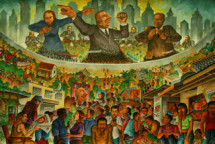Populism from above and below: agriculture and the political ambiguities of the Workers’ Party in Brazil
Temas
Regiones
Brazil has recently undergone a shift from economic growth to recession, as well as from a left-wing, neo-developmentalist politics to one on the far-right, authoritarian and economically ultraliberal. Such an economic and political U-turn touched upon the countryside in contrasting ways. This paper reflects on the politics of the past. It suggests that the road to regression was paved during the tenure of the Worker’s Party (PT), when politics were considered both popular and progressive. And it was under the PT’s rule when the ‘rural world’ mattered the most for politics.

Descargas
Autores
This paper argues that the expansion of agricultural exports enabled the leadership of Lula as a representative of interests ‘from below’ while leading a political project that protected and nurtured interests ‘from above’. That way, the PT, under Lula’s leadership, established an ambiguous, fetishized, and indeed, populist relation with its social base. Two contributions of the present paper can be highlighted. First, it offers an understanding of populism from the class political economy perspective and, with that in mind, it analyses the PT political project, the assessment of which helps to explain the country’s regressive turn, as well as to inform emancipatory politics.
The contradiction between ‘the sheer electoral weight of the poor, juxtaposed against the sheer scale of economic inequality’ makes the Brazilian democracy latently explosive. For that reason, the Brazilian political system, including its democracy, has also been utterly authoritarian or deceptive, conditioning and constituting itself a historically entrenched structure against class formation and struggle. Not surprisingly, populism, coup d’états and dictatorships permeate Brazil’s republican life.
Ayers and Saad-Filho (2014: 4) recall several events in history that unambiguously demonstrate how ‘political democracy was never meant to reach the economic realm’. The impeachment of Rousseff and the imprisonment of Lula are certainly illustrative of their point. As the authors explain, the ‘structural limits of capitalist democracy come into view when attempts to expand political control over the economic affairs are blocked, regardless of their popular backing or even legitimacy within the established order’ (Ibid.). Since the impeachment process, the MST became more openly supportive of the PT, including promoting a strong Free Lula campaign. While, in the author's understanding, they have been at the right side of History, their overt participation in Lula’s 2018 presidential campaign seems less clear whether it reflects a questionable pragmatism or a regrettable Lulism. To unleash the transformative potential from below, the populist fetish that gave rise to Lulism must be overcome.
Social transformation in Brazil will not come from above, or without class confrontation. Lula’s populist formula not only cast down the goal of development with social equity but launched Brazil on a long-term trajectory of instability and crisis. ‘Should passive improvement ever become active intervention’, completed Anderson (2011), ‘the story would have another ending’. From now on, a critical understanding of the mistakes of the past should guide how and in which basis social unification should be organized, and most important, for what it is organized. ‘A luta continua’, but class struggle must resume its critical role.